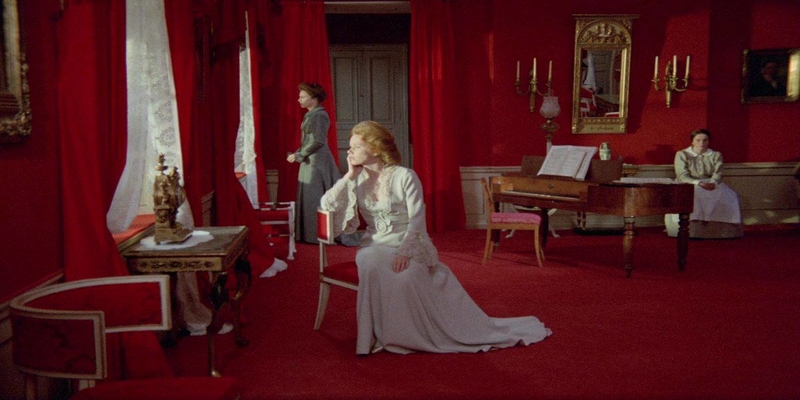← Back to Reviews
in
Cries and Whispers (1972) by Ingmar Bergman

In “Cries and Whispers”, we are introduced to three sisters and their maid. One sister is suffering from a terminal illness, so the others come to her aid to take care of her, but their process of doing so is not conventional, and far beyond what one might expect.
Bergman studies each of the four characters very carefully and meticulously. Their interactions with each other are filled with lovelessness and coldness, and this is a theme that one will become familiar with when it comes to this director. The fundamental coldness in humans and their inability to communicate, understand, or love each other, is so present in his filmography, especially and specifically in this feature.
To say that the film is devastating would be an understatement, and this is expected when the majority of the characters are emotionless, stoic, and extremely selfish. A viewer's expected reaction is to ask, what made these people turn this way? But the answer to such a question is too complicated to just be portrayed in an only 90 minutes long picture, so it can't be found only through the materiel we're given.
Bergman does eventually showcase some needed intimacy out of these characters via the ending, which is nothing but a wide open window to let the viewer breathe, after being suffocated by the characters' bleakness for such a long time.
If there’s one thing I'm not too fond of, it's the character of Karin (played by Ingrid Thulin). Whenever the film heavily focuses on her, I am simply left...bored, and this is odd because on paper, she is the most interesting character out of the bunch. This is then made up by the last 15 minutes of the film, which left me feeling a roller-coaster of emotions. Everything else is nothing short of entrancing. The dialogue overall is just as intriguing as in any Bergman film. The cinematography is particularly superb, and the acting is absolutely top-notch. This is most definitely one of the director’s best films, but this seems to be the case with all of his movies.
Bergman studies each of the four characters very carefully and meticulously. Their interactions with each other are filled with lovelessness and coldness, and this is a theme that one will become familiar with when it comes to this director. The fundamental coldness in humans and their inability to communicate, understand, or love each other, is so present in his filmography, especially and specifically in this feature.
To say that the film is devastating would be an understatement, and this is expected when the majority of the characters are emotionless, stoic, and extremely selfish. A viewer's expected reaction is to ask, what made these people turn this way? But the answer to such a question is too complicated to just be portrayed in an only 90 minutes long picture, so it can't be found only through the materiel we're given.
Bergman does eventually showcase some needed intimacy out of these characters via the ending, which is nothing but a wide open window to let the viewer breathe, after being suffocated by the characters' bleakness for such a long time.
If there’s one thing I'm not too fond of, it's the character of Karin (played by Ingrid Thulin). Whenever the film heavily focuses on her, I am simply left...bored, and this is odd because on paper, she is the most interesting character out of the bunch. This is then made up by the last 15 minutes of the film, which left me feeling a roller-coaster of emotions. Everything else is nothing short of entrancing. The dialogue overall is just as intriguing as in any Bergman film. The cinematography is particularly superb, and the acting is absolutely top-notch. This is most definitely one of the director’s best films, but this seems to be the case with all of his movies.
